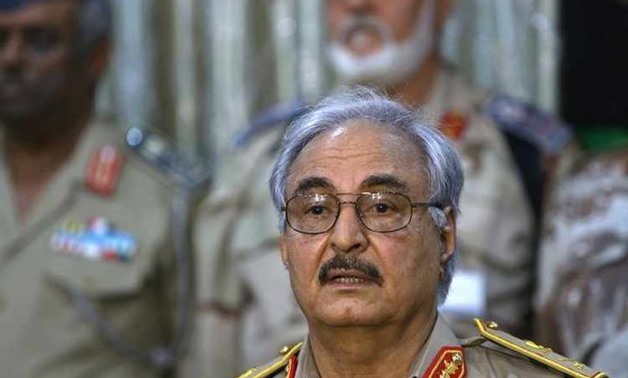
Libyan military commander Khalifa Haftar - File photo
CAIRO – 29 May 2018: Groups in western Libya have cast doubt on talks in Paris on Tuesday that aim to pave the way for elections in the divided country, fearing the meeting could play into the hands of their rival, eastern-based commander Khalifa Haftar.
Libya splintered following the 2011 NATO-backed revolt that toppled Muammar Gaddafi, and since 2014 has been divided into competing political and military factions based in Tripoli and the east. The United Nations is leading an effort to reunify the oil-rich nation and to organise national elections.
The Paris meeting is due to include Haftar, Tripoli Prime Minister Fayez Seraj, and the leaders of rival parliamentary assemblies, and urge them to agree to general principles for ending Libya's crisis, a French official said.
"There will be a collective commitment to do everything to ensure that the elections are held by the end of the year," the official said. France is also seeking agreement on unifying financial and security institutions.
Tripoli's State Council, one of Libya's two rival assemblies, voted to send a delegation to the talks, but also issued a series of demands including an immediate ceasefire in the eastern city of Derna and the lifting of a siege there by Haftar's Libyan National Army (LNA).
The LNA stepped up its campaign in Derna earlier this month and clashes continued there on Monday.
The State Council also said a U.N.-brokered political deal from 2015, which eastern factions have rejected, must remain in place, and that military institutions must operate under civilian authority.
Haftar has appointed military governors to replace elected mayors in much of eastern Libya. Opponents suspect him of seeking national power and fear he will return the country to authoritarian rule.
A group of 13 military councils and brigades in western Libya issued a statement saying that the Paris initiative did not represent them. "We call for real dialogue focused on the aspirations of Libyan society in its aspects," the statement said.
It also declared its opposition to "foreign interference" and to "any initiative aimed at normalising military rule".
Over the weekend, Tripoli armed groups displaced the Presidential Guard -- a force formed by Seraj's Government of National Accord with international backing -- from strategic positions at the capital's shuttered international airport and the prime minister's office. Diplomatic sources linked the move at least in part to unease over the Paris meeting.
Under President Emmanuel Macron, France has tried to expand its role in coaxing Libya's factions to end the turmoil. Last year Macron convened rare talks between Haftar and Seraj in Paris.
But critics have questioned the need for this week's talks, given an existing "action plan" launched last year by U.N. Libya envoy Ghassan Salame, which is also aimed at paving the way for elections.
"The steps that need to be taken were already pretty much known and identified by the action plan," said one diplomatic source. "So we don't need another plan, and my fear is that this new initiative if anything engenders extra confusion."
France says there will be broad international participation at Tuesday's talks and that they are in accordance with Salame's plans.
Given continuing divisions in Libya, the Paris meeting should not impose too rigid a framework on participants, to avoid "creating unrealistic expectations that, when dashed, can only harden existing narratives and further inflame tensions", the non-governmental International Crisis Group said in a briefing.

Comments
Leave a Comment